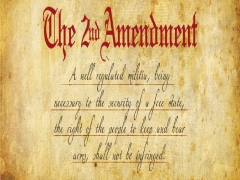The political Left needs a better political philosophy and it has to start with the concept of liberty.
Under debate between the Left and Right, between liberals and conservatives, are many matters: the nature of government, taxes, justice, and rights, but nothing more fundamental than the very concept of liberty itself. Everyone seems to agree that liberty is the core value of America. Its centrality reaches back to the Declaration of Independence, the Revolution, and animates the Constitution. Indeed, liberty is one of the core concepts of Western modernity.
But over the last half century, the conservative Right has done a much better job than the Liberal Left articulating its theory of liberty and thus its political philosophy. Liberty has been a concept dominated by the Right. The Left, by contrast, seems to lack a political philosophy at all and seems almost embarrassed by the concept of liberty, as if it is an antiquated concept whose time has passed. Liberals almost act the way conservatives charge: that in fostering welfare programs and creating an activist government, we are violating the principles of liberty. In not arguing over the meaning of liberty, liberals have relinquished a core tool in the fight for America’s minds and hearts. For liberty, after all, is that symbol that evokes our history, ours emotion and passions, and our sense of modern selves.
The Right Has At Least Two Theories of Liberty
It is true that the Right’s understanding of liberty, and its corresponding political philosophy, is not always consistent. The Right has at least two very different conceptions of both liberty and of conservativism that have been fused into what now constitutes the thinking of the political Right.
The first strand is a libertarian one which stresses that liberty is in essence associated with free markets and small government. This view, which is often linked back mistakenly to a Jeffersonian view of liberty, justifies itself on utilitarian grounds and has been articulated most forcefully by the libertarian leaning side of the conservative movement. It harkens back to the economic theorizing of F. A. Hayek, Ludwig von Mises, Milton Friedman, and Richard Epstein, and ultimately back to earlier thinkers such as Adam Smith, John Stuart Mill and Jeremy Bentham, among others. In this view, the maximization of liberty leads to the best in human welfare. Pursuing self-interest is the path to the best situation for all. Thus attempts by government to intervene or do better than markets necessarily fail because the market and the invisible hand are superior than any kind of central planning. This utilitarian oriented theory of liberty contrasts with another view of liberty that starts from a conception of natural rights and God.*
In this other second strand of conservativism, God created humans as free beings, with intelligence and a higher moral code. They are different and superior to the other animal species and have a distinctive set of moral responsibilities that define them. The human purpose, and the purpose of America itself, is the pursuit of liberty and the defense of this higher moral code, which is often associated with Christianity in particular, but can also be associated with a Western view of the moral self. This view harkens back to the views of Russell Kirk and William Buckley, among others. Ayn Rand’s philosophy also sits here in claiming not only that self-interest has utility but is morally good. On this view, government is often intervening inappropriately in people’s sacred lives and undermining the moral values that were embedded in America’s founding tradition. This strand of conservativism tends to be more religious in orientation (with the exception of Rand), more rooted in traditional Christian perspectives, and more attentive to duties. It can be rooted in traditional religious conceptions, but it also has philosophical foundations in thinkers such as Edmund Burke.
These two variations of conservative political philosophy have fused or joined together, sometimes tightly and sometimes in conflict, in the political Right and what has come to be called Movement Conservativism. And while I am here oversimplifying the arguments and variations of each, the modern conservative mind does, nonetheless, have a theory of liberty and a political philosophy that animates commitment and passion. Any conservative can tell you how liberty animates their commitments. Not so with liberals.
The Left Lacks a Theory of Liberty
The Left has plenty of passion and commitment too, of course. But the Left’s political philosophy, and in particular its philosophy of liberty, is underdeveloped and thus weaker than it should be. The Left argues from concepts of justice, rights and equality, much less than from the concept of liberty. As a result, liberals as far as I can see do not articulate a theory of liberty very clearly or the political philosophy behind their various positions. What is it that makes something a right and why? What justifies the concept of equality and how far should it extend? What is the justification of taxation and constraint of business? What is it that allows us to recognize the difference of justice and injustice?
The Left knows that inequality is not fair, that racism still influences the color of people in prison and the distribution of wealth. The Left knows that big corporations should not be treated as persons with speech rights. While the Right can go on forever explaining its reasons why government should not be able to touch a person’s property, why taxes constitute stealing, or why government should not tell a person whom to conduct business with, the Left seems to stutter when it has to explain the foundation of its moral positions. “It’s just right.”
But how do we know? By what standard of truth, if any, do we know what is just and right and what is not? How does the liberty of America align with restrictions on markets, an investment in government, and a set of taxes that redistribute wealth. To whom does the liberal Left look to articulate its political philosophy? Who are its intellectual heroes? Some might say John Rawls or Amartya Sen. Others might say Robert Reich, Paul Krugman, Elizabeth Warren, as more popular spokespersons. I’d be interested in hearing other people’s list of our modern left intellectual heroes and liberal political philosophers.
But in general, I believe, the ideas of these thinkers have not made it to the average liberal masses. This is ironic in some ways since the liberals are supposed to be more intellectual than conservatives. But the liberal masses , I believe, don’t know why they hold the positions they do. They just do. They know they are true, but they just can’t say why. And for that reason we are less persuasive than we can be. Let me be clear, I think if you ask liberals why they believe what they believe they will have an answer. But there is no theoretical political philosophy that animates liberals as a movement. Everyone has their own answer. And there is no coherent and developed theory of liberty that ties liberal positions together.
Perhaps the political Left is still struggling to leave behind its earlier historical flirtation with socialist principles. Indeed, the conservative movement with which we are familiar today developed its modern intellectual tradition in large part in reaction to Communism and the Cold War. And as it came to power, in the transition from Goldwater to Reagan, conservatives continue to argue that any liberal position is collectivist in nature, and therefore evil and on the slippery slope to communism.
That is obviously not true. But the reply has to be a bit stronger than that. What is our theory of liberty that reaches back to the founders, that is compatible with a strong active government, with the taking of taxes, and the definition of rights that animate our notions of justice? Why is gay marriage a right, but other things, not rights? How do we draw the lines and by what view of liberty do we measure what’s right? There are many ways in which liberals can answer that question. I have written about one possibility.* But whatever the answer, the time has come to return to foundations and to reclaim the concept of liberty as a liberal concept and one of our own.
_____________
*My own attempt to answer this question is in my recent Beyond Liberty Alone.
*For a short critique of the libertarian view of liberty, see my “The Market Should Not be 0ur God (and economists should no longer be our source of morality) and the more detailed discussion in my book.




